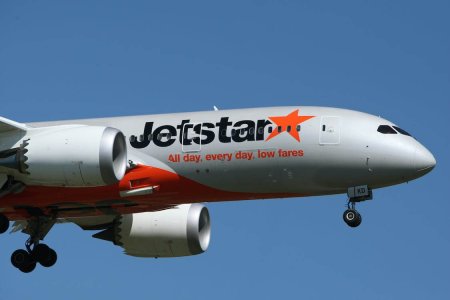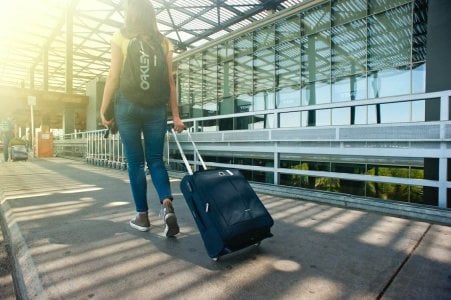Aussies slashing travel budgets amid cost-of-living woes this year, poll says
- Replies 7
We’re a month into the new year, and, as predicted, Australians are still beset with the high cost of living that plagued the country in 2022.
All across the nation, many are resorting to cost-cutting measures in an effort to keep up with sky-high inflation rates.
Understandably, this leads to necessary lifestyle changes and belt-tightening, with one casualty being travel.
According to a new survey by Power Retail, Aussies are cutting back on their travel budgets in order to make ends meet this year.
The research found that although two thirds (66%) of Australians had intended to take a trip domestically or overseas this year, they'd be doing so on a much tighter budget.
When it comes to domestic travel, half of those surveyed revealed that they want to spend $2000 or less this year.
Regarding long-haul trips overseas, two-thirds of the Aussies surveyed stated that they’d allocate less than $10,000 for a single trip — a sign of how costly life can be in this day and age. (Though we have to say, having $10,000 set aside for an international trip is an enviable position to be in…)

In terms of location, around 75 per cent said they were looking at at least two trips on home soil, while just a bit over half at 56 per cent are considering one international trip.
Commenting on the research, Grant Arnott — the CEO of Power Retail’s parent company Global Marketplace — told Yahoo! Finance: 'Australians are keen to travel after a few years of lockdowns and they are doing so in droves.’
‘But they are being met with much higher costs than anticipated and their overall cost of living has also increased, whether that be increased interest rates, rents, higher fuel costs and general inflation.’
Arnott said the scenario right now for most Aussies is providing ample reasons for tightening their belts.
‘People are being more conservative. While they want to travel, they don’t want to overspend at this point in time until they see a levelling out of inflation and interest rates,’ he said.
Power Retail found in its poll that the high cost of living is the top factor hindering Aussies from travelling locally (61 per cent) and internationally (53 per cent).

Meanwhile, the high 7.8 per cent inflation rate posted last year has also triggered concerns the Reserve Bank of Australia might raise interest rates again in response.
Having said that, the government believes that this most recent figure is the ceiling for the rise in prices of goods and services for Australia, and that inflationary pressures are expected to lessen as 2023 progresses. Time will tell.
The silver lining for travellers?
Undoubtedly the uncertain nature of the coming months as far as Australian consumers are concerned will spur more reserved attitudes towards spending for travel.
Arnott says that this, in conjunction with ‘normality resuming’ from COVID, will encourage players in the travel sector like airlines and tour operators to up their marketing game.
‘We are going to see more packages and more travel operators — whether that’s airlines or hotel groups or other tourism operators — starting to play with price more and I think that will be timely for consumers who haven’t been able to travel,’ he said.
 On a similar note, airline and aviation industry expert Neil Hansford also predicts cheaper flights in the coming months because of increased capacity on flights, especially now that we’re past the hectic Christmas holiday season.
On a similar note, airline and aviation industry expert Neil Hansford also predicts cheaper flights in the coming months because of increased capacity on flights, especially now that we’re past the hectic Christmas holiday season.
Expedia Group Managing Director Daniel Finch also earlier advised Aussies to book domestic and international flights in advance by several months as an added tip to save money.
‘If you are booking domestic flights, booking at least three months in advance you can save around 25 per cent, and international a minimum of six months in advance you can (also) save 25 per cent,’ he said.
Well, we do hope before anything else that the coming months see less strain on Aussies wallets and bank accounts!

In the meantime, you might also want to read about one woman’s solo travel adventure around the world from Kuala Lumpur in Malaysia to London, England — at 60 years old!
You could also find out how one man’s trip from Canberra to Perth by plane had him in for an experience he’d never forget.
So, what is your reaction to this story? If you have travel plans this year, how has the recent economic situation affected your outlook?
Tell us in the comments section below!
All across the nation, many are resorting to cost-cutting measures in an effort to keep up with sky-high inflation rates.
Understandably, this leads to necessary lifestyle changes and belt-tightening, with one casualty being travel.
According to a new survey by Power Retail, Aussies are cutting back on their travel budgets in order to make ends meet this year.
The research found that although two thirds (66%) of Australians had intended to take a trip domestically or overseas this year, they'd be doing so on a much tighter budget.
When it comes to domestic travel, half of those surveyed revealed that they want to spend $2000 or less this year.
Regarding long-haul trips overseas, two-thirds of the Aussies surveyed stated that they’d allocate less than $10,000 for a single trip — a sign of how costly life can be in this day and age. (Though we have to say, having $10,000 set aside for an international trip is an enviable position to be in…)

The high cost of living Australians currently face is forcing many to rethink their purchases. Image Credit: Pexels/Anna Tarazevich
In terms of location, around 75 per cent said they were looking at at least two trips on home soil, while just a bit over half at 56 per cent are considering one international trip.
Commenting on the research, Grant Arnott — the CEO of Power Retail’s parent company Global Marketplace — told Yahoo! Finance: 'Australians are keen to travel after a few years of lockdowns and they are doing so in droves.’
‘But they are being met with much higher costs than anticipated and their overall cost of living has also increased, whether that be increased interest rates, rents, higher fuel costs and general inflation.’
Arnott said the scenario right now for most Aussies is providing ample reasons for tightening their belts.
‘People are being more conservative. While they want to travel, they don’t want to overspend at this point in time until they see a levelling out of inflation and interest rates,’ he said.
Power Retail found in its poll that the high cost of living is the top factor hindering Aussies from travelling locally (61 per cent) and internationally (53 per cent).

Some Aussies in a recent poll admitted they’re planning to spend less for domestic and international trips. Image Credit: Pexels/Pascal Borener
Meanwhile, the high 7.8 per cent inflation rate posted last year has also triggered concerns the Reserve Bank of Australia might raise interest rates again in response.
Having said that, the government believes that this most recent figure is the ceiling for the rise in prices of goods and services for Australia, and that inflationary pressures are expected to lessen as 2023 progresses. Time will tell.
The silver lining for travellers?
Undoubtedly the uncertain nature of the coming months as far as Australian consumers are concerned will spur more reserved attitudes towards spending for travel.
Arnott says that this, in conjunction with ‘normality resuming’ from COVID, will encourage players in the travel sector like airlines and tour operators to up their marketing game.
‘We are going to see more packages and more travel operators — whether that’s airlines or hotel groups or other tourism operators — starting to play with price more and I think that will be timely for consumers who haven’t been able to travel,’ he said.
Key Takeaways
- The rising cost of living is forcing Aussies to cut back on their travel spending.
- Half of Aussies surveyed in a recent poll set on travelling this year planned to spend $2,000 or less on domestic trips this year, while two thirds planned to spend less than $10,000 on international travel.
- The rising cost of living was the main factor preventing Aussies from travelling, both internationally and domestically.
- Some experts are looking forward to market adjustments in the travel industry for 2023 with better deals and cheaper flights expected due to high cost-of-living pressures and post-pandemic growth in the airline industry.
Expedia Group Managing Director Daniel Finch also earlier advised Aussies to book domestic and international flights in advance by several months as an added tip to save money.
‘If you are booking domestic flights, booking at least three months in advance you can save around 25 per cent, and international a minimum of six months in advance you can (also) save 25 per cent,’ he said.
Well, we do hope before anything else that the coming months see less strain on Aussies wallets and bank accounts!

Some experts foresee better deals and cheaper flights for Australians in the coming months as the travel industry adjusts to high cost-of-living pressures and moves forward from the COVID pandemic. Image Credit: Pexels/Oleksandr Pidvalnyi
In the meantime, you might also want to read about one woman’s solo travel adventure around the world from Kuala Lumpur in Malaysia to London, England — at 60 years old!
You could also find out how one man’s trip from Canberra to Perth by plane had him in for an experience he’d never forget.
So, what is your reaction to this story? If you have travel plans this year, how has the recent economic situation affected your outlook?
Tell us in the comments section below!







